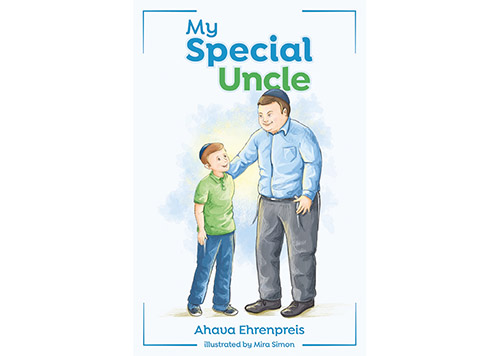
Reviewing: “My Special Uncle” by Ahava Ehrenpreis. 2021. Mosaica Press. English. Hardcover. 13 pages. ISBN-13:
978-1957579030.
For children who have had no exposure, encountering a person with Down syndrome or other cognitive or socially atypical behaviors can be confusing and perhaps a little frightening—all the more so if that person looks like an adult yet behaves differently from other adults he knows.
In her new book, “My Special Uncle,” Ahava Ehrenpreis explains, in a clear, approachable way, situations that children may encounter when meeting individuals with cognitive or emotional issues. As the mother of Saadya a’h, her son who had Down syndrome and was niftar at the age of 36, Ehrenpreis has years of experience explaining Saadya’s words and behavior to his young nieces and nephews, as well as to other children and adults. She tackles the questions children often raise, such as, “Why can’t my uncle walk me across the street?” and “Why can’t he take me to the store by himself?”
Other scenarios that the charming narrator in this book experiences include understanding why someone may appear distant or angry for no apparent reason or perhaps very sad and unapproachable.
Individuals with neurotypical-divergent behaviors are much more visible today due to the increased acceptance and the concept of inclusion in social and religious situations, and, of course, in an extended family. But this exposure requires an explanation to children who observe behaviors that may be frightening and are certainly difficult to understand. In this beautifully illustrated book, concepts that Ehrenpreis previously presented for an adult reading audience in articles and in her book “More Than Special” (Artscroll/Mesorah 2021) are encapsulated in situations that a child may encounter in daily life.
In easily understood and simple terms, Mommy explains to her mystified little son that his Uncle Dovi is indeed a grown-up we love and respect, but Hashem made him “special.” The child recognizes that “special” indicates something good (like birthdays or surprise presents). Activities that other grown-ups may be able to do (like take us across the street himself or drive a car) might not be safe for Uncle Dovi, but he loves to play ball and watch Uncle Moishe and Jewish music videos with us, and he makes us happy in so many other ways.
The concept that Hashem makes people in different ways and the value of including them in our lives even if there are difficult moments (such as when Uncle Dovi appears to be angry, distant or depressed) is a vital one. Having no way to understand unusual behaviors, children might feel responsible for the inexplicable actions of the person who is special. Mommy assures the youngsters that regardless of how the person acts or feels, it is our job to love them even during the difficult moments, as they are all part of the world Hashem created. Inclusion and acceptance of everyone into our personal lives and welcoming them into society at large is a concept that if developed at a young age sets a pattern for adulthood.
The simple narrative and lovingly illustrated scenarios allow children to identify and comprehend the enigma of individuals with behaviors not easily understood in a normative context. This book is an important tool in the formation of lifelong attitudes that can serve to impact and enhance the lives of individuals with special needs or who have neurodivergent behaviors.
This book and the author’s “More Than Special” have received accolades from professionals in the field as well as from rabbanim as to the value and importance for children (and adults) to read and absorb their messages for the benefit of everyone in our society.
By Chava Shapiro













